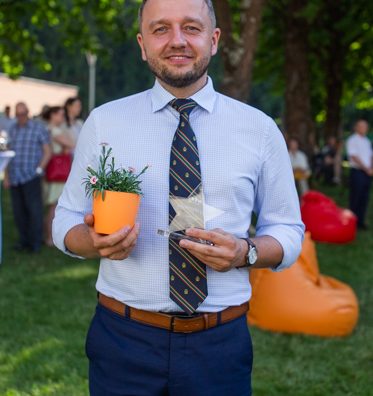
Mykolas Romeris University (MRU) Law School Lecturer Juozas Valčiukas was recently recognized for Law experiential learning classes that he organized. June 22nd, during MRU's annual nominations, Dr. Valčiukas won in the category of the Year's Best Initiative. Dr. Valčiukas has organized 56 such classes for students during the last year.
Recently, Dr. Valčiukas agreed to sit down and talk about his idea, its implementation and popularity at the university and beyond.
Dr. Valčiukas, what is the idea behind experiential learning?
Experiential learning is a form of teaching and learning where students can learn from the experiences of university alumni, partners, practitioners. It is another platform for studying law, where the student experiences the topics of law, law subjects, studies and the idea of the university itself. Such experiential lessons of legal reasoning and argumentation allow to look differently at both the topics of law and the career opportunities of a lawyer. I think it becomes another business card of our University, an exclusivity whose quality and benefits can be described by our students. It should be noted that the quarantine period revealed that experiential learning can also be well organized remotely.
It can be said that through experiential teaching, the university becomes, in the true sense of the word, a huge forum for discussion, involving students, lecturers, alumni, university partners, and legal practitioners. It is a path that connects a huge community, where experience unites with youthful curiosity. Experiential studies are a path of personality formation, career decision, beginning from the first day of university.
How is the experiential learning idea implemented at MRU's Law School?
As an integral part of studies, experiential learning at the School of Law unfolds in two directions. First, it is integrated into the structure of the cumulative score of law study subjects, when students receive an experiential task with experiential training with practitioners on a subject chosen by the lecturer. After completion of the task, they collect a part of the cumulative score. In this way, together with the help of the lecturer, partner, alumni, practitioner, students learn to apply knowledge in real situations, forming practical skills and competencies. The student's horizons and network of contacts expand. For example, in the subject of criminal procedure law, after training by prosecutors on a specific topic, students were able to realize their theoretical and practical knowledge by performing an experiential task to write a reasoned statement about a suspicious document.
The second area in which experiential learning is successfully implemented is in the virtual sphere, when such meetings take place after lectures and seminars in the evenings - 2 or 3 times per week. This is a more informal opportunity for the student to voluntarily prolong studies, delve into them together with legal professionals who have amassed significant experience. Along with judges, legal and fintech specialists, attorneys and various legal specialists from Lithuania and the international area, students here supplement their existing arsenal of knowledge and learn to apply knowledge in given situations. Students thereby develop skills and competencies. What's more, in the sharing of experiences students imagine themselves in a certain field of law. Invisible processes of making decisions on career path or personality formation and new connections are being made. First-year student Melania after one evening of experiential learning wrote to alum Tadas Žukas in Switzerland. She asked him he could become her mentor in the law and fintech areas. Student Eglė found her true calling in the intellectual property law area. Žukas not only agreed to become a mentor at her request, but also the student requested to take up an internship in the international organization.